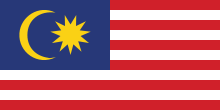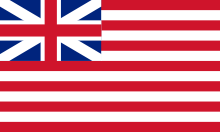- Flag of Malaysia
-
Flag of Malaysia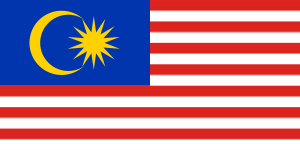
Name Jalur Gemilang ("Stripes of Glory") Use Civil and state flag and state ensign 
Proportion 1:2 Adopted 26 May 1950 (original 11-point star and 11 stripes)
16 September 1963 (current 14-point star and 14 stripes)Design Fourteen horizontal stripes alternating red and white; in the canton, a yellow crescent and 14-point star on a blue field Designed by Mohamed Hamzah[N 1] The flag of Malaysia, also known as the Jalur Gemilang (Malay for "Stripes of Glory"),[1] comprises a field of 14 alternating red and white stripes along the fly and a blue canton bearing a crescent and a 14-point star known as the Bintang Persekutuan (Federal Star). The 14 stripes, of equal width, represent the equal status in the federation of the 13 member states and the federal government, while the 14 points of the star represent the unity between these entities.[2] The crescent represents Islam, the country's official religion; the blue canton symbolizes the unity of the Malaysian people; the yellow of the star and crescent is the royal colour of the Malay rulers.[3]
In blazon, the Malaysian flag is described as: "A banner Gules, seven bars Argent; the canton Azure charged with decrescent and mullet of fourteen points Or." This means "a red flag with seven horizontal white stripes; the upper-left (hoist) quarter is blue with a yellow waning crescent (i.e. horns pointing to sinister) and a yellow 14-pointed star."
Contents
History
The flag of Malaysia, which was first raised on September 16, 1963, originated from the flag of the Federation of Malaya. Prior to the creation of the national flag, each state in Malaya had its own flag, many of which are unchanged in design to this day.
Selection
When the Federation of Malaya replaced the short lived Malayan Union, the federation government through the Federal Legislative Council called for a design contest for a new flag. Three flags were forwarded to the public. The first flag had 11 white stars with two Malay kris (daggers) in the middle against a blue backdrop. The second flag "concentric circle of 11 stars around crossed keris on a blue field." The third "had 11 alternate red and white stripes and a yellow crescent and a five-pointed star on a blue background in the top left hand corner." The third design - by Mohamad Hamzah of the Public Works Department - was chosen as the winner through a public poll held by The Malay Mail.[4] Since Malaya was fighting the communists during the Malayan Emergency, the five-pointed star had the uncanny resemblance with the communists' symbols. Therefore, the star was modified to accommodate six more points.
The Malayan flag was approved by King George VI on 19 May 1950 and was first raised in front of Istana Selangor on 26 May 1950. On 31 August 1957, it was raised upon independence at Merdeka Square in place of the British Union Flag.
The designer
The Malayan flag was designed by Mohamed Hamzah, a 29-year-old architect working for the Public Works Department (JKR) in Johor Bahru, Johor. He entered the Malayan flag design competition in 1947 with two designs which he completed within two weeks. The first design was a green flag with blue kris in the middle, surrounded by 15 white stars. The second design, which was among the three finalists, was similar to the current flag but with a five-pointed star. It borrows major design elements from the East India Company flag, notably the red and white stripes. The competition attracted 373 entries and voting was made by the general public via post. Malayan senior statesman Dato' Onn Jaafar met with Mohamed Hamzah after he won the competition and suggested that the star be changed to an 11-pointed one to represent all the Malayan states.
Mohamed Hamzah died just short of his 75th birthday on 13 February 1993 in Jalan Stulang Baru, Kampung Melayu Majidee, Johor.[5]
Modifications
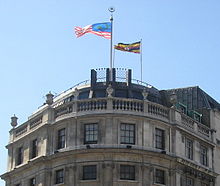 The Malaysian flag flying above the Tourism Malaysia office in Trafalgar Square, London. The Flag of Uganda is seen by its side over Uganda House.
The Malaysian flag flying above the Tourism Malaysia office in Trafalgar Square, London. The Flag of Uganda is seen by its side over Uganda House.
Following the formation of Malaysia on September 16, 1963, the design of the Malayan flag was modified to reflect and honour the new states in the federation.
Three additional stripes were added to the existing flag and the star was given 14 points to reflect the federation of the original 11 states in Malaya plus Sabah, Sarawak, and Singapore; this design remained the same even after Singapore's expulsion from the federation two years later. When Kuala Lumpur was designated a Federal Territory on February 1, 1974, the additional stripe and the point in the star were appropriated to represent this new addition to the federation. Eventually, with the addition of two other federal territories — Labuan in 1984 and Putrajaya in 2001 — the fourteenth stripe and point in the star came to be associated with the federal government in general.
In 1997, when Malaysians were invited to name the flag, then Prime Minister Tun Dr Mahathir bin Mohammad picked the name Jalur Gemilang to project the country's onward drive towards continuous growth and success.
Mark of Respect
During the National Day celebrations, everyone is encouraged to fly the Jalur Gemilang at their homes, office buildings, shops and corporate premises.
- If the flag is fixed at home, it is to be raised pointing towards the road.
- If the flag is put in a group of flags with state and private company flags, the Malaysian flag must be raised in between two flags and its pole placed higher than the rest.
Gallery
See also: List of Malaysian flags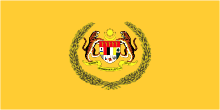 Flag of the Yang di-Pertuan Agong.
Flag of the Yang di-Pertuan Agong. Flag of Federated Malay States from 1896 to 1950Flag of Federation of Malaya from 1950 to 1963Flag of Malaysia in current useConstruction of the Malaysian flag
Flag of Federated Malay States from 1896 to 1950Flag of Federation of Malaya from 1950 to 1963Flag of Malaysia in current useConstruction of the Malaysian flagFlag anthem
The Jalur Gemilang flag anthem was introduced in 1997. The lyrics were written by Pak Ngah.
Original lyrics
- Merahmu bara semangat waja
- Putihmu bersih budi pekerti
- Kuning berdaulat payung negara
- Biru perpaduan kami semua
- Puncak dunia telah kautawan
- Lautan luas telah kauredah
- Membawa semangat jiwa Merdeka
- Semarak jaya kami warganya
- Empat belas melintang jalurnya
- Semua negeri dalam Malaysia
- Satu suara satu semangat
- Itu sumpah warga berdaulat
- Jalur Gemilang di bawah naunganmu
- Jalur Gemilang kami semua bersatu
- Perpaduan ketaatan
- Amalan murni rakyat Malaysia
- Jalur Gemilang megah kami terasa
- Jalur Gemilang kibarkanlah wawasan
- Merah, putih, biru, kuning
- Jalur semangat kami semua
- (3x)
- Berkibarlah!, berkibarlah!, berkibarlah!,
- Jalur Gemilang!
English translation
- Your Red represents steely will
- Your White represents clean and kind character
- Yellow of the Sovereign, the country's protector
- Blue for all of us in unity
- You have reached the heights of the world
- You have traveled the wide waters
- Bearing the spirit of independence
- We are members of its successful will
- Fourteen stripes across
- For each of the states of Malaysia
- One voice, one spirit
- So its sovereign citizens solemnly swear
- Jalur Gemilang, beneath your care
- Jalur Gemilang, we unite
- Sovereign unity
- Malaysian citizens' good charity
- Jalur Gemilang, how proud we feel
- Jalur Gemilang, proclaim our vision
- Red, white, blue, yellow
- Are the stripes of our resolve
- (2x)
- Flutter-on, flutter-on, flutter-on
- Jalur Gemilang!
Other ensigns and flags
Government vessels use the Jalur Gemilang as the state ensign. The following is a table of the other ensigns used in Malaysia.
Flag Type Description Flag ratio 
 Civil ensign
Civil ensignThe civil ensign of Malaysia used by civilian vessels has a red background with the Jalur Gemilang in a blue-fimbriated canton. 1:2 
 Army ensign
Army ensignThe flag used by the Army of Malaysia has a red background with the Jalur Gemilang in the canton and the army emblem in the fly. 1:2 
 Naval ensign
Naval ensignThe flag used by the Royal Malaysian Navy has a white background with the Jalur Gemilang in a red-fimbriated canton and an emblem consisting of an anchor and two crossed traditional kris (daggers) in the fly. Naval ships of the Royal Malaysian Navy use this flag as the naval ensign. 1:2 
 Air Force ensign
Air Force ensignThe flag used by the Royal Malaysian Air Force has a pale blue background with the Jalur Gemilang in the canton and the Bintang Persekutuan (14-point star) in the fly. 1:2 
 Malaysian Maritime Enforcement Agency blue ensign
Malaysian Maritime Enforcement Agency blue ensignThe flag used by the Malaysian Maritime Enforcement Agency has a dark blue background with the Jalur Gemilang in the canton and the logo of the agency in the fly. 1:2 Federal Star (Bintang Persekutuan)
 Malaysian Chinese Association (MCA) flag
Malaysian Chinese Association (MCA) flag
The Federal Star, which is similar in concept of Australia's Commonwealth Star, represents the close federation of the States of Malaysia and its Federal government. It is also used on the Royal Malaysian Air Force roundel, the Malaysian Chinese Association (MCA) flag and the former United Malayan Banking Corporation (UMBC) logo.
Similar flags
The flag of Malaysia is very similar to the flag of the United States, which has one less stripe and 50 stars in the Blue Canton. However, the Malaysian flag is based on the flag of the British East India Company; which, in turn, may have influenced the US flag. Because of this, flags based off the US flag, such as those of Liberia and Bikini Atoll, also bear a resemblance to the flag of Malaysia.
See also
Footnotes
- ^ Mohamed Hamzah designed the flag of Malaya. The current flag is an adaptation of Hamzah's original design.
References
- ^ "Malaysian Flag and Coat of Arms". myGovernment Malaysian Government's official portal. http://www.malaysia.gov.my/EN/Main/MsianGov/MsianFlagAndCrest/Pages/MsianFlagAndCrest.aspx. Retrieved 7 September 2011.
- ^ "Malaysia Flag". TalkMalaysia.com. http://all.talkmalaysia.com/the-malaysian-flag/. Retrieved 2009-09-15.
- ^ Flags Of The World Malaysia: Description
- ^ Sonia Ramachandran. Golden Merdeka Memories: National flag chosen by people in one of country's first public polls. New Straits Times. August 18, 2006.
- ^ "Sejarah Bendera Malaysia", Malay Text, Saturday, 29-Aug-2009, http://shw.tnpesonapicture.fotopages.com/20973807.html, retrieved 2010-04-08
External links
Flags of Malaysia National Flag of MalaysiaStates Federal territories Federal Territory • (Kuala Lumpur • Labuan • Putrajaya)National flags and coats of arms National flags National coats of arms Categories:- National flags
- Flags of Malaysia
- National symbols of Malaysia
- Malaysian patriotic songs
Wikimedia Foundation. 2010.

